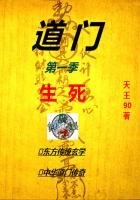But Abner had been obliged to have a formula for such occasions.
"Ye'll pay for yer dinner first," he said submissively, but firmly, "and make yer remarks agin the food arter."
The stranger flushed quickly, and his eye took an additional shade of red, but meeting Abner's serious gray ones, he contented himself with ostentatiously taking out a handful of gold and silver and paying his bill. Abner passed on, but after dinner was over he found the stranger in the hall.
"Ye pulled me up rather short in thar," said the man gloomily, "but it's just as well, as the talk I was wantin' with ye was kinder betwixt and between ourselves, and not hotel business. My name's Byers, and my wife let on she met ye down here."
For the first time it struck Abner as incongruous that another man should call Rosalie "his wife," although the fact of her remarriage had been made sufficiently plain to him. He accepted it as he would an earthquake, or any other dislocation, with his usual tolerant smile, and held out his hand.
Mr. Byers took it, seemingly mollified, and yet inwardly disturbed,--more even than was customary in Abner's guests after dinner.
"Have a drink with me," he suggested, although it had struck him that Mr. Byers had been drinking before dinner.
"I'm agreeable," responded Byers promptly; "but," with a glance at the crowded bar-room, "couldn't we go somewhere, jest you and me, and have a quiet confab?"
"I reckon. But ye must wait till we get her off."
Mr. Byers started slightly, but it appeared that the impedimental sex in this case was the coach, which, after a slight feminine hesitation, was at last started. Whereupon Mr. Langworthy, followed by a negro with a tray bearing a decanter and glasses, grasped Mr. Byers's arm, and walked along a small side veranda the depth of the house, stepped off, and apparently plunged with his guest into the primeval wilderness.
It has already been indicated that the site of the Big Flume Hotel had been scantily cleared; but Mr. Byers, backwoodsman though he was, was quite unprepared for so abrupt a change. The hotel, with its noisy crowd and garish newness, although scarcely a dozen yards away, seemed lost completely to sight and sound. A slight fringe of old tin cans, broken china, shavings, and even of the long-dried chips of the felled trees, once crossed, the two men were alone!
From the tray, deposited at the foot of an enormous pine, they took the decanter, filled their glasses, and then disposed of themselves comfortably against a spreading root. The curling tail of a squirrel disappeared behind them; the far-off tap of a woodpecker accented the loneliness. And then, almost magically as it seemed, the thin veneering of civilization on the two men seemed to be cast off like the bark of the trees around them, and they lounged before each other in aboriginal freedom. Mr. Byers removed his restraining duster and undercoat. Mr. Langworthy resigned his dirty white jacket, his collar, and unloosed a suspender, with which he played.
"Would it be a fair question between two fa'r-minded men, ez hez lived alone," said Mr. Byers, with a gravity so supernatural that it could be referred only to liquor, "to ask ye in what sort o' way did Mrs. Byers show her temper?"
"Show her temper?" echoed Abner vacantly.
"Yes--in course, I mean when you and Mrs. Byers was--was--one? You know the di-vorce was for in-com-pat-ibility of temper."
"But she got the divorce from me, so I reckon I had the temper," said Langworthy, with great simplicity.
"Wha-at?" said Mr. Byers, putting down his glass and gazing with drunken gravity at the sad-eyed yet good-humoredly tolerant man before him. "You?--you had the temper?"
"I reckon that's what the court allowed," said Abner simply.
Mr. Byers stared. Then after a moment's pause he nodded with a significant yet relieved face. "Yes, I see, in course. Times when you'd h'isted too much o' this corn juice," lifting up his glass, "inside ye--ye sorter bu'st out ravin'?"
But Abner shook his head. "I wuz a total abstainer in them days," he said quietly.
Mr. Byers got unsteadily on his legs and looked around him. "Wot might hev bin the general gait o' your temper, pardner?" he said in a hoarse whisper.
"Don't know. I reckon that's jest whar the incompatibility kem in."
"And when she hove plates at your head, wot did you do?"
"She didn't hove no plates," said Abner gravely; "did she say she did?"
"No, no!" returned Byers hastily, in crimson confusion. "I kinder got it mixed with suthin' else." He waved his hand in a lordly way, as if dismissing the subject. "Howsumever, you and her is 'off' anyway," he added with badly concealed anxiety.
"I reckon: there's the decree," returned Abner, with his usual resigned acceptance of the fact.
"Mrs. Byers wuz allowin' ye wuz thinkin' of a second. How's that comin' on?"
"Jest whar it was," returned Abner. "I ain't doin' anything yet.
Ye see I've got to tell the gal, naterally, that I'm di-vorced.
And as that isn't known hereabouts, I don't keer to do so till I'm pretty certain. And then, in course, I've got to."
"Why hev ye 'got to'?" asked Byers abruptly.
"Because it wouldn't be on the square with the girl," said Abner.
"How would you like it if Mrs. Byers had never told you she'd been married to me? And s'pose you'd happen to hev bin a di-vorced man and hadn't told her, eh? Well," he continued, sinking back resignedly against the tree, "I ain't sayin' anythin' but she'd hev got another di-vorce, and FROM you on the spot--you bet!"
"Well! all I kin say is," said Mr. Byers, lifting his voice excitedly, "that"--but he stopped short, and was about to fill his glass again from the decanter when the hand of Abner stopped him.
"Ye've got ez much ez ye kin carry now, Byers," he said slowly, "and that's about ez much ez I allow a man to take in at the Big Flume Hotel. Treatin' is treatin', hospitality is hospitality; ef you and me was squattin' out on the prairie I'd let you fill your skin with that pizen and wrap ye up in yer blankets afterwards.















